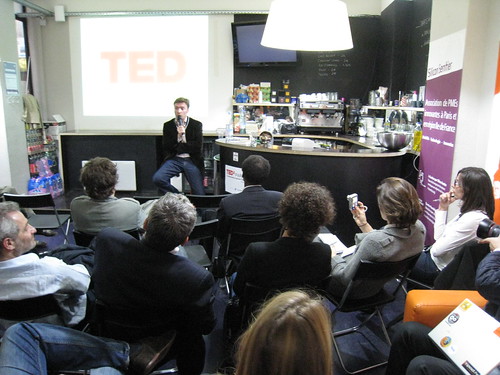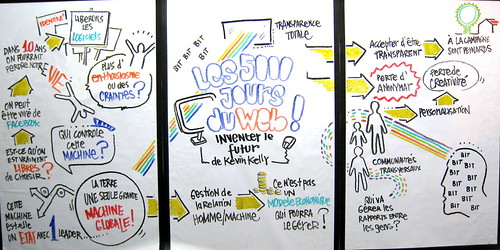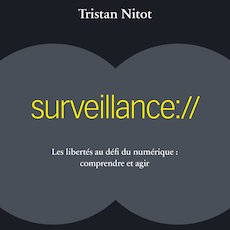1st TEDxParis. Photo From Rodrigo Sepùlveda used under CC license
I was invited Thursday evening to participate to the first edition of TEDx Paris, an independently organized event where talks previously recorded on video at the TED conference are shown and discussed with the crowd. I was eager to debate about Kevin Kelly's talk about The next 5000 days of the Web.
Vinvin chairing the happiness talk at Tedx Paris
In short, Kevin Kelly tries to measure the size of the Internet in a meaningful way, and the closest thing he comes with is the human brain: in several ways, the Internet is as complex as a human brain. But the Internet doubles in size every 2 years, he says. Kevin Kelly also considers the Net as a single distributed very big machine, on which we're relying more and more every day.
TEDX Paris: session on the 5000 next days of the Web
This leads to the question "what will it like in 2040?". This is a question that I am often asked by reporters. Frankly, I don't know. I tend to answer by quoting Alan Kay "the best way to predict the future is to invent it". I don't know what the future will be, and having a huge always-on computer that each of us relies on is half exciting and half scary. How can we make sure that the Internet of the future is more exciting than scary? I'm just submitting a couple of ideas, that you can discuss in the comment, and that I'll discuss here on the Standblog:
- Users should be able to invent what one can do with it without having to ask permission
- Users should not be banned from it (unless they decide not to participate, of course)
- Users should control their experience.
I know this sounds very vague for now, but this is just the beginning of the conversation. Mitchell Baker and Mark Surman are also discussing this on their respective blogs and they are ahead of me. Go read them! (you could also read the Mozilla Manifesto).
In a more concrete way, I think that Open Source / Free Software is the way to go, and one should be able to host his/her own instances of the services he/she uses. In this regard, project like Weave or Laconi.ca are – in my opinion – the way to go.









4 réactions
1 De Michel Mikiane Lévy-Provencal - 30/05/2009, 16:55
TEDx est typiquement un exemple de projet hyper génératif comme nous l'avons evoqué jeudi soir... Nous l'espérons en tout cas. Nous avons hate avec toute l'équipe de s'atteler au prochain RDV en tout cas.
2 De Greg K Nicholson - 30/05/2009, 19:42
1. Users should be able to invent what one can do with it without having to ask permission
2. Users should not be banned from it (unless they decide not to participate, of course)
3. Users should control their experience.
Or “3 reasons why Facebook is evil.”
3 De Nico - 30/05/2009, 23:03
Or “3 reasons whyADHOPI is evil.”
4 De dfjsdfj - 31/05/2009, 06:57
Kevin Kelly is an embarassing con artist.